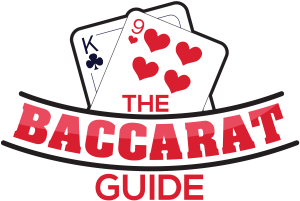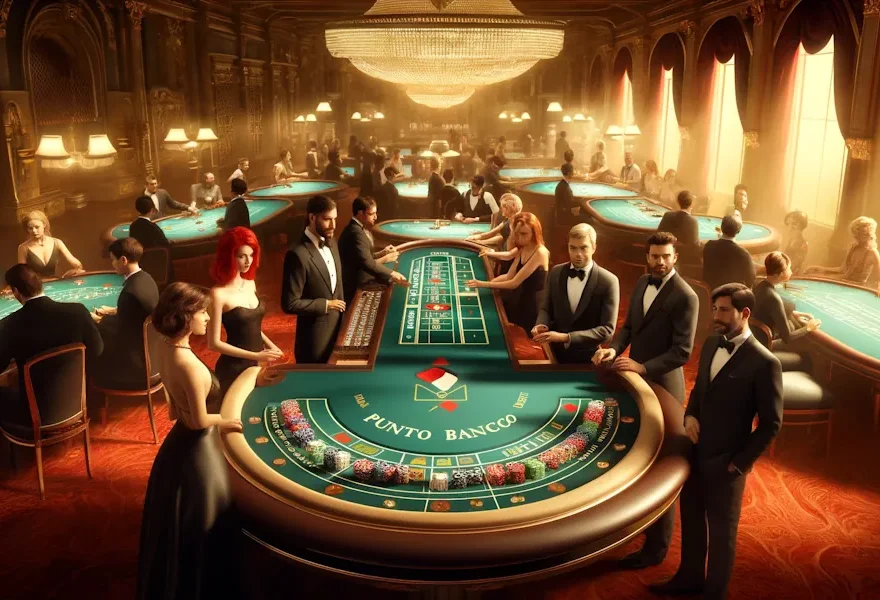This article is about the Baccarat variation Punto Banco.
Punto Banco (North American Baccarat) is a variation of baccarat played in the United States, Australia and Canada.
In this version of baccarat the casino banks the game at all times. Players may bet on either the player or the banker, which are merely designations for the two hands dealt in each game. The cards are dealt, one to the ‘Player’ first then to the ‘Banker’, ‘Player’ then ‘Banker’ again. Each has two cards. This is the initial deal. Both cards in each hand are added together and the croupier calls the total. (e.g. five to the ‘Player’, three to the ‘Banker’) From this position the ‘Tableau’ or table of play is used to determine if further cards need to be drawn. A maximum of three cards per hand may be drawn to achieve a winning hand. Therefore the object of the game is to bet on the hand with the highest total.
The Tableau in Punto Banco
- Pictures and 10s count as 0. If the initial deal has a hand totalling 8 or 9 no further cards are drawn.
- If the ‘Player’ has an initial total of 0, 1, 2, 3, 4 or 5, the ‘Player’ draws another card.
- If the ‘Player’ has an initial total of 6 or 7, the ‘Player’ stands and draws no further card.
- If the ‘Player’ has an initial total of 8 or 9, this is a natural and neither the ‘Player’ nor the ‘Banker’ draw further cards.
- If the ‘Banker’ has an initial total of 0, 1 or 2, the ‘Banker’ draws another card.
- If the ‘Banker’ has an initial total of 3, the ‘Banker’ draws another card when the ‘Player’s’ third card is anything but an 8.
- If the ‘Banker’ has an initial total of 4, the ‘Banker’ draws another card when the ‘Player’s’ third card is a 2, 3, 4, 5, 6 or 7.
- If the ‘Banker’ has an initial total of 5, the ‘Banker’ draws another card when the ‘Player’s’ third card is a 4, 5, 6, or 7.
- If the ‘Banker’ has an initial total of 6, the ‘Banker’ draws another card when the ‘Player’s’ third card is a 6 or 7.
- If the ‘Banker’ has an initial total of 7, the ‘Banker’ stands and draws no further cards.
- If the ‘Banker’ has an initial total of 8 or 9, this is a natural and neither the ‘Player’ nor the ‘Banker’ draw further cards.
- If the ‘Banker’ has an initial total of 0, 1, 2, 3, 4 or 5 and the ‘Player’ has an initial total of 6 or 7 and stands, the ‘Banker’ draws another card.
- The ‘Banker’ must stand on 6 when the ‘Player’ has a 6 or 7 on the initial deal.
The croupier will deal the cards according to the tableau and the croupier will announce the winning hand – either ‘Player’ or ‘Banker’. Losing bets will be collected and the winning bets will be paid according to the rules of the house. Usually even money or 1-1 will be paid to the player and 95% to the ‘Banker’, 5% commission to the house. (Commission Baccarat) Some casinos pay even money or 1-1 to both ‘Player’ and ‘Banker’ except when the ‘Banker’ wins with a total of 6. Then the ‘Banker’ will be paid 50% or half the original bet.
Should both the ‘Banker’s’ hand and the ‘Player’s’ hand have the same value at the end of the deal the croupier shall announce “Egalite – tie bets win.” All tie bets will be paid at the odds of 8-1 and the croupier shall not touch the bets on either ‘Player’ or ‘Banker’.
Traditional Punto Banco
The traditional form of punto banco baccarat is played at an oval table, similar to the chemin de fer version. The table is staffed by a croupier, who directs the play of the game, and two dealers who collect and pay bets as well as tallying commissions due. Six or eight decks of cards are used, normally shuffled only by the croupier and dealers. Like chemin de fer, the shoe is passed around from player to player, who acts as the dealer of the cards and as “banker,” but he or she does not actually bank the game. Indeed, the “banker” may bet on the player hand if he or she wishes, or may pass the shoe along to another player — the role of the “banker” is merely ceremonial. The person who bet the highest amount on the player hand is given the player-hand cards, though he or she simply turns the cards over, annoucing their total. The croupier instructs the “banker” on if or when to deal third cards, and then announces the winning hand.
In casinos in Las Vegas and Atlantic City, this version of baccarat is usually played in special rooms separated from the main gaming floor, ostensibly to provide an extra measure of privacy and security because of the high stakes often involved. The game is frequented by the highest of high rollers, who may wager tens or hundreds of thousands of dollars on a single hand. Australian tycoon Kerry Packer was particularly fond of the game, having won and lost large sums over the years. Minimum bets are relatively high, often starting at 25 USD and going as high as 500 USD. Posted maximum bets are often arranged to suit a player, but maximums of 10,000 USD per hand are common
Despite its simplicity (or perhaps because of it), the punto banco version of baccarat offers some of the lowest house advantage available in a casino. The player bet has a house advantage of 1.24%, and the banker bet (despite the 5% commission) has an advantage of 1.06%. The tie bet has a much higher house advantage of 14.44%, based on six decks in play. 1
Because of its attraction for wealthy players, a casino may win or lose millions of dollars a night on the game, and the house’s fortunes may even affect the bottom line of a corporation’s quarterly profit and loss — notations of the effects of major baccarat wins and losses are frequent in the quarterly reports of publicly-traded gaming companies.
Mini-baccarat is essentially the same game, but played at a smaller table very similar to a blackjack table. A single dealer handles the entire game, including dealing the cards. The pace is usually much faster than the “big baccarat” version. Betting minimums and maximums are usually lower. In casinos outside of Las Vegas and Atlantic City, this is frequently the only version of baccarat that is offered.

